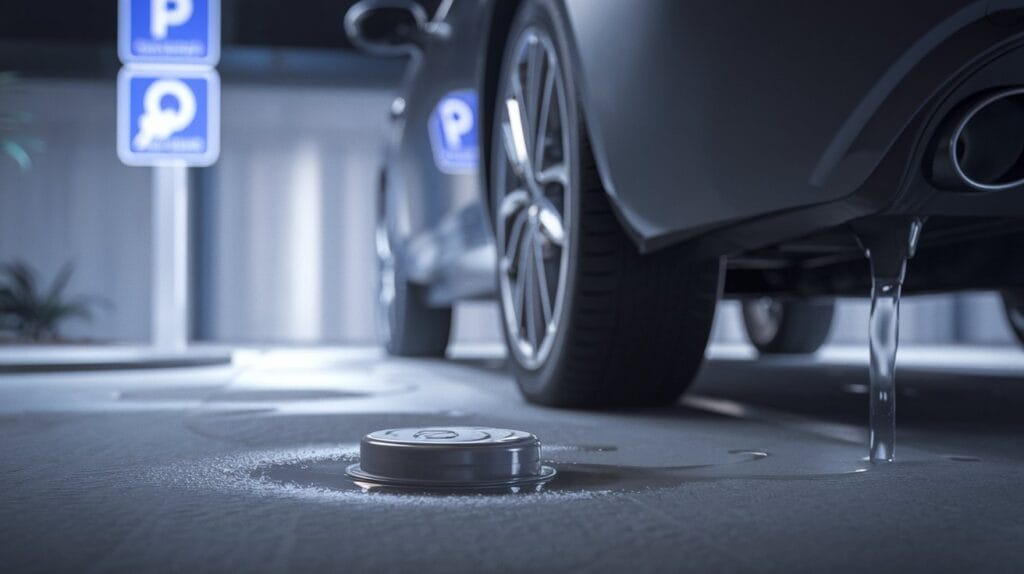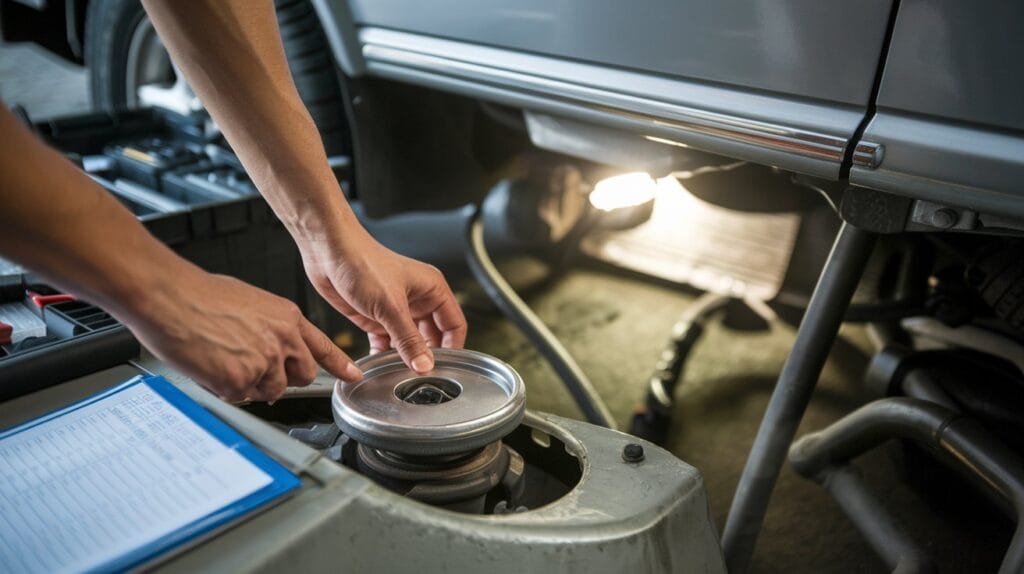If you’ve noticed your gas gauge dipping overnight or after your car has been parked for an extended period, you’re not alone. Many drivers find themselves puzzled by unexplained fuel loss when the car isn’t running. In this article, we’ll explore why you lose gas when your car is off, why this happens, what might be causing it, and how you can address the issue to save Money and maintain vehicle safety.
To prevent fuel loss when your car is off, start by checking for leaks in the fuel lines, filler tube, and around the gas cap. Replace any worn or damaged parts and ensure the gas cap fits tightly to avoid evaporation. Regular maintenance, like inspecting the fuel system and parking on level ground, can help conserve fuel and prevent unnecessary losses.
Common Reasons for Gas Loss While Your Car is Off

When your car is off, fuel should ideally remain steady in the tank. However, certain conditions can lead to gas loss even when the engine isn’t running. Let’s look at some of the most common culprits.
1. Evaporation
Evaporation may seem unlikely with today’s fuel systems, but it can still happen. If your gas cap is loose, damaged, or doesn’t fit properly, gas vapors can escape from the tank. This is especially common in older vehicles or if you’ve recently purchased a replacement gas cap that isn’t a perfect fit.
- Loose or Damaged Gas Cap: A loose or poorly fitted gas cap allows fuel vapors to escape, particularly in warm conditions. You might notice a faint gas smell around the cap, a clear indicator that fuel vapors are leaking.
- Aftermarket or Incompatible Caps: Replacement caps from third-party sellers may not seal properly, leading to vapor leaks and gradual fuel loss.
Ensuring your gas cap is tightly closed and in good condition can prevent evaporation and help maintain fuel levels.
2. Fuel Leaks
Fuel leaks are another major cause of unexplained fuel loss. Over time, certain parts of the fuel system—such as the fuel lines, filler tube, and even the fuel tank—can degrade, leading to small leaks that become noticeable overnight.
- Deteriorated Fuel Lines: Fuel lines, especially in older vehicles, are prone to wear and tear. A small leak can cause a drop in fuel level, particularly noticeable if you park your car overnight. Look for any wet spots under the car, as they may indicate a fuel leak.
- Rotted Filler Tube: If the filler tube is cracked or rotted, gas can seep out and lead to fuel loss. This is a common issue with vehicles that have been used in areas with extreme weather or where road salts are common.
- Signs of a Leak: Often, a fuel leak will produce a distinct gasoline smell, especially around the fuel tank or under the car. Spotting any wet patches on the ground near your vehicle after it’s been parked for a while is also a strong indicator of a fuel leak.
Checking for leaks is essential to prevent fuel waste and potential hazards.
3. Faulty Fuel Pressure Regulator (FPR)
The fuel pressure regulator (FPR) helps control the amount of fuel entering your engine. When the FPR is faulty, it can leak, allowing gas to escape when the car is off.
- Symptoms of a Faulty FPR: If you notice a strong gas odor near the fuel rail or FPR, it could indicate a problem. Additionally, some vehicles may exhibit a minor dip in fuel gauge readings due to a leaky FPR.
- Residual Pressure in the System: Even when the engine is off, the fuel system remains pressurized for a while. A failing FPR might allow this residual pressure to release fuel, leading to gas loss.
Consider having a mechanic inspect the FPR if you suspect it’s causing fuel loss. A faulty FPR is a relatively inexpensive part to replace, but ignoring the problem could lead to more severe fuel system damage.
4. Gasoline Theft
Though less common, gasoline theft does happen. If you park in a public area or an insecure location, someone may be siphoning gas from your tank.
- Signs of Theft: Look for signs of tampering near the gas cap, like scratches or a loose cap. In some cases, you may notice that more gas is missing than what would typically be lost from a leak or evaporation.
- Preventative Measures: Using a locking gas cap can prevent gas theft. Additionally, parking in well-lit, secure areas can discourage potential thieves.
Also Read: Top Secrets to Keep Your Car Cool While Parked
Impact of Parking Conditions on Gas Loss
Where and how you park can affect your gas readings and create the illusion of gas loss.
Parking on Uneven Ground
Parking on an incline can cause your fuel gauge to display lower or fluctuating levels due to the way the fuel rests in the tank. This is especially noticeable in older cars or vehicles with a less sophisticated fuel level sensor.
- Gauge Discrepancies: When you park on a slope or incline, fuel shifts within the tank, which can make it appear as though you’ve lost gas. After parking on level ground for a while, the gauge may correct itself.
- Solutions: If you suspect uneven ground is affecting your fuel reading, try parking on level ground overnight and check your gauge in the morning.
Diagnosing Fuel Loss Problems

If you suspect your car is losing fuel while it’s off, here’s a step-by-step guide to diagnosing the issue.
Check the Gas Cap
The gas cap is often the first place to check when you notice unexplained fuel loss.
- Test the Fit: Make sure the cap is securely in place and clicks when tightened. If it’s loose or doesn’t fit correctly, it may need replacement.
- Look for Signs of Wear: A cracked or worn cap won’t seal properly, allowing fuel vapors to escape. Replacing it with an OEM (original equipment manufacturer) cap can ensure a tight fit.
Inspect for Leaks
Next, check for any visible signs of leaks around your vehicle.
- Inspect the Fuel Lines: With the car parked in a safe, well-ventilated area, look under the vehicle for any signs of wet spots or dampness near the fuel lines.
- Examine the Filler Tube and Connections: Look for cracks or worn areas around the filler tube, as well as any leaks around fuel line connections. If you notice any leaks, it’s best to get them repaired by a qualified technician.
Check the Fuel System Components
Certain parts of the fuel system are prone to wear over time, which can lead to fuel loss.
- Fuel Pump: In some cases, a failing fuel pump can contribute to fuel loss. However, the fuel pump typically shows symptoms when the car is running, such as stalling or difficulty starting.
- Fuel Injectors: When fuel injectors become clogged, they can leak gas. Checking the fuel injectors requires professional inspection, so consider consulting a mechanic if you suspect an issue.
Addressing and Preventing Gas Loss
Once you’ve identified the cause, taking steps to address and prevent further fuel loss is key.
Replace Faulty Parts
Replacing parts that contribute to fuel loss can help you save money in the long run and prevent further damage to your car.
- Gas Cap Replacement: Replace a damaged or ill-fitting gas cap with one that fits properly to prevent vapor leaks.
- Fuel Lines and FPR: Replacing deteriorated fuel lines and a faulty FPR can prevent leaks and ensure the fuel system functions efficiently.
Park in Secure, Level Locations
Parking on level ground not only prevents gauge fluctuations but also helps reduce the chance of fuel theft.
- Secure Parking Locations: Choose well-lit and secure areas to park, particularly if you suspect fuel theft. Locking gas caps can also act as a deterrent to potential thieves.
Regular Vehicle Maintenance
Routine maintenance can keep your fuel system healthy and prevent issues like clogged injectors, damaged fuel pumps, and vapor leaks.
- Fuel System Inspection: Have your fuel system inspected periodically to identify any worn components before they lead to fuel loss.
- Injector Cleaning: Regular cleaning of fuel injectors prevents clogs that can lead to leaks, saving you money on fuel and repair costs.
Summary and Key Takeaways
Unexplained gas loss when your car is off can be a frustrating and costly issue. By understanding the potential causes—such as evaporation, fuel leaks, faulty FPRs, and parking conditions—you can take proactive steps to identify and address the problem. Routine inspections and simple adjustments, like replacing the gas cap or parking on level ground, can make a big difference in preventing fuel loss.
FAQs
Yes, extreme temperatures can cause fuel to expand or contract, which might slightly alter the gas gauge reading. In hot weather, fuel expansion can lead to minor evaporation, especially if the gas cap isn’t sealed well, while cold weather can make it seem like there’s less gas due to contraction.
This can happen due to fuel shifting within the tank, particularly if the car is parked on uneven ground. Additionally, some older fuel gauges aren’t very precise and can show slightly different readings as fuel settles or temperature changes.
A faint gas smell can be normal, especially in older cars, but if the odor is strong, it could indicate a leak or a problem with the fuel system. It’s best to have it checked by a mechanic, as a strong gas smell can be a sign of a fuel leak or loose gas cap.
Fuel gauge fluctuations in the morning can be due to temperature changes causing fuel to expand or contract overnight. Additionally, if the car is parked on uneven ground, the gauge may display a different level as the fuel shifts in the tank. Both factors can cause minor variations in the gauge reading.
If gas is evaporating, you may notice a faint gasoline smell around the gas cap or fuel tank area, particularly after the car has been sitting for a while. Checking for a loose or damaged gas cap can help, as it’s often a common culprit in fuel vapor loss.
If you detect a fuel smell, first check that the gas cap is secure and undamaged. If the smell persists, inspect for visible leaks under the car or near the fuel lines. A lingering fuel odor could indicate a fuel leak, so if you’re unsure, it’s best to have a mechanic examine your vehicle to ensure safety.